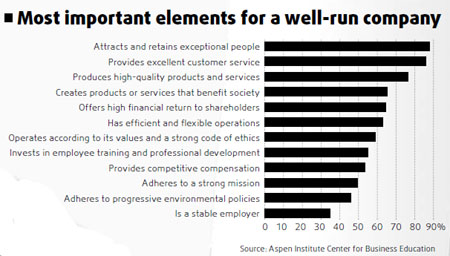



Tomorrow's China business leaders, enrolled in the country's top business schools believe that a well-run company can fulfill its corporate social responsibilities (CSR), by adhering to a strong mission, operating according to its values and a strong code of ethics, and adhering to progressive environmental policies.
Yet they also see socially responsible business practices primarily as advancing government, community and employee relations and less about bottom-line business benefits, such as reduced costs and risks and increased revenue.
The findings come from a report, titled "Where Will They Lead - 2007; Engaging the Values and Vision of China's Next-Generation Business Leaders, compiled by the United States-based Aspen Institute Center for Business Education (AspenCBE), a MBA education materials supply and development institution and the Guanghua School of Management, affiliated with Peking University.
The report summarizes the findings of a survey of 748 MBA students at 14 leading mainland business schools regarding their attitudes about role of business in society.
Chinese society and people are paying more attention to CSR and MBA students are the future business leaders in China, says Nancy McGaw, managing director of business and society projects with AspenCBE.
"How do they view the social responsibilities of companies, and how does business school culture and content shape them? Understanding the answers will help business-school instructors identify relevant topics and effective teaching methods," says McGaw.
According to the report, surveyed students believe that firms primarily gain reputation and image benefits from fulfilling their CSR, rather than "bottom-line" business benefits such as cost and risk reduction or revenue improvement. Some 78 percent of the respondents cite "a better public reputation/image" as a key benefit, while only 3 percent cite "increased revenue".
The students also say they are concerned about the role of business as a leading societal institution.
They cite lack of investor confidence, corporate scandals, breakdown in trust between employees and management, an increase in extreme social and environmental activism, and questions about executive compensation and incentives as key problems.
Although over 40 percent of the responding students say their business schools are preparing them "a lot" to manage value conflicts, just 27 percent "strongly agree" that they are learning to analyze the potential impacts of their decision on all stakeholders and only 19 percent "strongly agree" that they have opportunities to practice ethical or responsible decision making as part of the MBA programs.
The report also finds that Chinese MBA students are very interested in having a positive impact on society during their careers, but few choose that option ahead of baseline job concerns, such as compensation, career development and skill development, especially in the first few years of their career.
However, women are much more likely than men to rate responsible business practices of potential employers as very important to their job decision. Male respondents comprised 68 per cent of the survey sample.
Older students take a relatively traditional view of social responsibilities. Compared to younger students, they are more likely to see social responsibility as a way to satisfy external stakeholders, such as customers, the general public, and the government, and are less likely to cite bottom-line business concerns as potential benefits.
For example, 27 percent of students older than 32 years cite "fewer regulatory/legal problems" as one of the three top benefits of social responsibility, compared to only 15 percent of students younger than 27.
When the survey was conducted last autumn, 30 percent of the respondents were younger than 27, and 21 percent were older than 32.
Students approaching graduation take a broader view of what constitutes well-run company than their counterparts just starting MBA. On many other topics, however, students at the beginning of the MBA program have very similar opinions to those students who are further on in the program, suggesting that business schools do little to shape their attitudes about the role business plays in society.
According to the survey organizer, 56 percent of the respondents describe themselves as having "just started" the MBA program, 26 percent indicate, "I am about halfway through", and 18 percent say they will "graduate soon".
MBA students in China will face many competing, often contradictory, expectations about the role of business in society and their individual responsibilities as managers as they advance through their career. However, they say that their MBA experience falls short in helping them develop the capability to deal with these issues.
"It is a very meaningful survey for companies operating in China, which for the first time takes a look at CSR consciousness among MBA students - the future business leaders at the market," says Yang Dongning, professor with the Guanghua School of Management and co-coordinator of the survey.
He notes that business schools should take efforts to help students realize the importance of CSR and get the skills to run and lead ethical businesses.
The professor suggests that related curriculum should be formulated in line with the business trend under the new market environment that combines business benefits and social responsibilities.
(China Daily 12/29/2008 page8)













